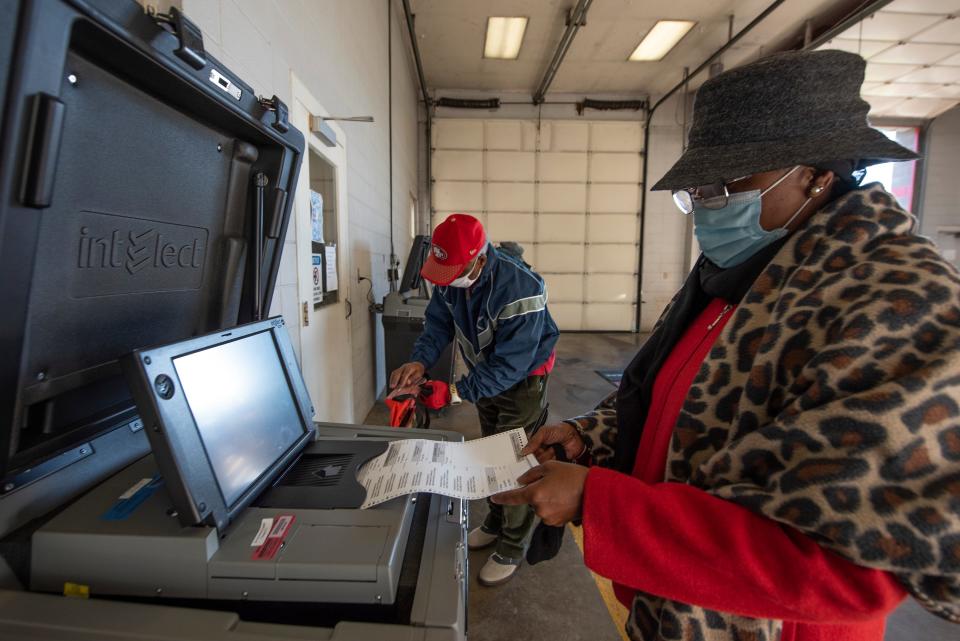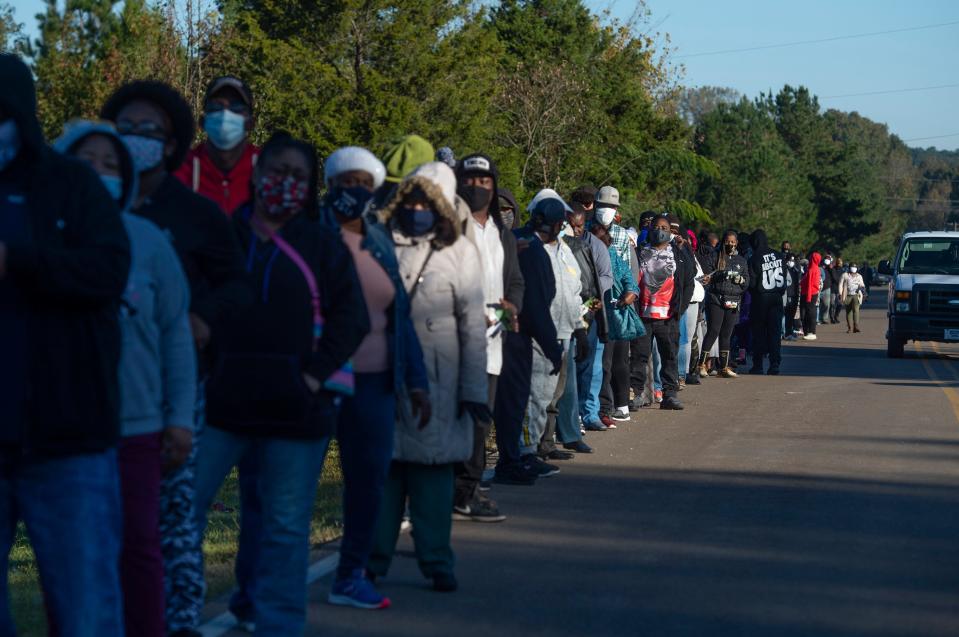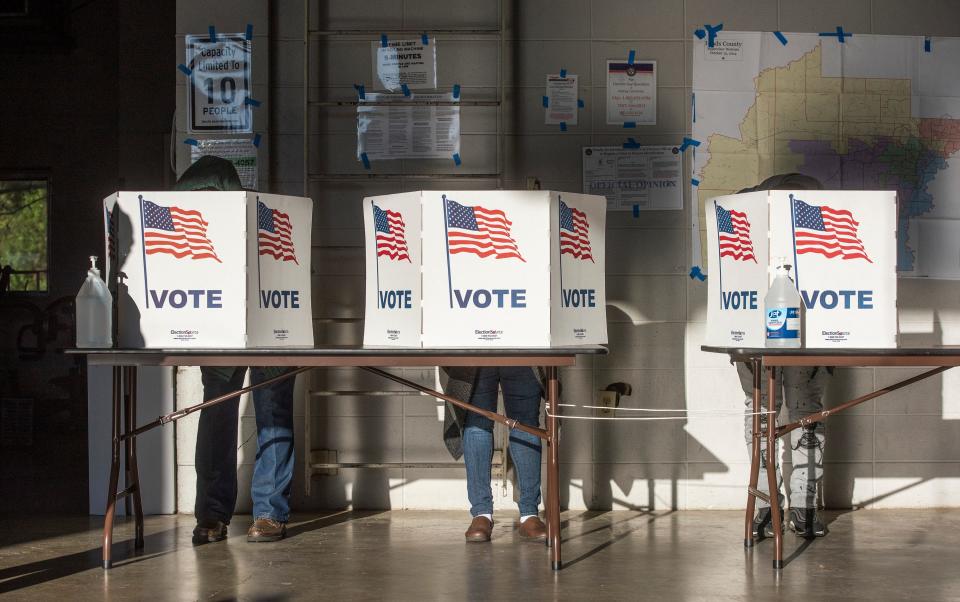Black voters are making the Mississippi governor’s race more competitive. How will they use that power in 2024?
In 1964, Flonzie Brown-Wright, then 22, attempted to register to vote for the first time as a Black resident living in Canton, Mississippi.
Brown-Wright, now 81, told USA TODAY all Black people were given an official 21-item registration questionnaire that asked for their name, address, phone number and other identifying information. But she said it also included questions such as “How many feathers are in a chicken?” and “How many polka dots are in a yard of fabric?”
Question 17 directed her to the registrar’s desk, where she had to reach in a cigar box, pull out a section of the Mississippi Constitution and interpret habeas corpus, a constitutional right to protect against illegal imprisonment.
“They did not teach us anything about the Mississippi Constitution in my segregated school,” Brown-Wright said. “So that was no way I knew about that.”
Once she handed in her completed questionnaire to a registrar, she said he looked at her angrily and told her she didn't pass. As she asked the man what mistakes she made, Brown-Wright said he cursed at her and demanded she leave. She had to wait 30 days to register to vote again.
Since then, Brown-Wright became the first Black woman to serve as an election commissioner in Canton and a civil rights activist committed to increasing voting rights. But she emphasized the fight for Black voices to be heard is far from over.
"This is not a fad. This is not something you pick up and put down just like you go to the grocery store. This is a lifetime commitment," said Brown-Wright, who lives in Jackson now.
In 2023, activists have been eyeing Mississippi's governor’s race as an opportunity to support Black voters. That's because it will be the first gubernatorial election since the overturning of a Jim Crow-era law that used an Electoral College-type system to elect state officials and reduced the power of Black voters.
“I think if there is a major change during this year's gubernatorial race, that will re-energize folks and get them more optimistic about what the possibilities are going into 2024,” said Carol Blackmon, the Mississippi state organizer for Black Voters Matter.
Here's a closer look at what this race could mean for Black voters heading into next year's presidential election.
'We keep trying'
A Jim Crow-era measure in Mississippi’s 1890 state constitution required any individual running for state office to win the majority of the popular vote and a majority of the state’s 122 House districts to be elected. If no candidate was able to do both, then the Mississippi House decided on the election outcome.
“The intent was to limit the power of Black voters…and when you have gerrymandered legislative districts that makes it even worse,” said Jarvis Dortch, executive director of the American Civil Liberties Union of Mississippi.
Dortch pointed to how a majority of the House districts in Mississippi contain a high percentage of white voters, making it difficult for a Black-preferred candidate to get elected.
But in 2020, voters approved a constitutional amendment to repeal the system, instead requiring candidates to receive only a majority of the popular vote to get elected in the state. Runoff elections would be held in situations where three or more candidates fail to get the popular vote.
“Black voters in Mississippi, when they feel like they can have a say in the election, and they think there's a chance to make real change, they're more likely to come out. So removing any type of barrier that could limit that, I think it's a good thing,” Dortch said.
The new electoral process will impact the heated governor’s battle between Democratic candidate Brandon Presley and Republican incumbent Trump ally Tate Reeves, among other state-level races.
"Now that it's just a popular vote, then the influence of the Black vote means more," said Charles V. Taylor Jr., the executive director of the Mississippi state conference of the NAACP.
An overwhelming majority of Black voters tend to lean towards Democrats, Taylor Jr. explained. The last time the state had a Democratic governor was from 2000 to 2004, and Republican governors have dominated elections in recent years.
Efforts are underway from several organizations, including Black Voters Matter and the NAACP, to increase Black voter turnout in 2023 − with an eye towards 2024's much larger elections too.
"We keep trying. We keep working with African American people," Blackmon said. "We're working with churches. We're working with grassroots organizations across the state, and we're working with people one on one to try and make sure that folks do turn out to vote."
A polling average from FiveThirtyEight found that Reeves is leading the gubernatorial race by several percentage points.

'Battle that needed to be won'
Activists and other voting rights champions say they feel empowered to head to the polls this year knowing that the Jim Crow-era law was struck down. But they agree work still needs to be done with regards to ballot access.
“I think that the overturning of that law is a step in the right direction. It does give us a little more power at the ballot box because it does say that the decisions that we make at the ballot box can't be overturned by lawmakers at the state capitol,” said Nsombi Lambwright-Haynes, a 50-year-old Jackson resident and executive director of the nonprofit One Voice, which fights for an equal voice in marginalized communities.
Dana Bolden, an 18-year-old senior at Jim Hill High School in Jackson and a first-time voter, told USA TODAY, "I'm really glad that it is repealed, because at some point, you have to sit back and look at it as our constitutional rights being revoked.”
Francine Jefferson, a 56-year-old county veteran’s service officer in Lexington, called the law being overturned a “battle that needed to be won.”
But she added: “Wherever we have a victory, we still have obstacles and things that are holding us back from being able to really, really exercise our right to vote and continuing to intimidate voters and suppress that vote.”
Thessalia Merivaki, associate professor of politics at Mississippi State University, explained that some enduring hurdles to voter access include a lack of online voter registration, complicated mail voting requirements, and failures in consistent outreach to Black voters.
Courtney Body, a 28-year-old community advocate in Jackson, said there are a slew of practices in Mississippi the state could implement to make voting easier for all citizens, such as same-day voter registration and no excuse absentee voting.
“It’s just extremely difficult for voters to gain access. In 2023 in the legislative session, they passed a voter purging deal allowing officials to purge voters after specific elections if they are inactive voters in the field,” Body said. “And so it's things like that that is extremely frustrating to Mississippi voters.”
Voter suppression is an issue advocates say they hope state and federal lawmakers address this year and in next year's elections.
“A lot of times when we look at who's on the federal ballot, who's on the federal ballot really impacts what happens to us here statewide,” Lambright-Haynes said. “So that's really really important to us here in Mississippi, even though Mississippi is not one of those hot states for national elections. Because when you consider laws just like the John Lewis Act, yeah, that would have serious implications for us in Mississippi if that law were to pass.”
The John Lewis Act aims to bolster the Voting Rights Act of 1965 and guarantees equal access to the ballot box for all voters, according to the Southern Poverty Law Center.

'So many Mississippians struggling'
Voter suppression isn't the only issue Black people are riding on in 2024.
Taylor Jr. said that his organization this year in partnership with the national NAACP office launched focus groups in which canvassers would strike up three-to five-minute conversations with Black voters on issues important to them.
The organization also conducted a 20-question survey talking to hundreds of voters in three areas across the state: the coastal region, the Delta region and the Jackson Metro Area region. Among the top issues voiced among Black voters included healthcare, public safety, education, jobs and housing.
“The thing that I was happy about with the survey was people love this place. They wanted to make it better. They wanted for the children to grow up here, but just the harsh realities, that there are so many Mississippians struggling and so for them they did kind of feel that current state leaders neglected our communities,” Taylor Jr. said.
He added: "What we need to do more is have a conversation about issues.”
Black voters USA TODAY interviewed also expressed similar concerns based on their personal experiences living in Mississippi.
Jefferson said that in her neighborhood, she has seen hospitals close down, tons of dirt roads and areas with no electricity. Six years ago when Jefferson’s husband passed away, she said it took the ambulance 40 minutes to get to her place. The nearest hospital for the type of care he needed was an hour away.
“We only had I think one ambulance in the county at that time… we just had no alternative,” Jefferson said.
Robert Sulton, a 56-year-old auditor in Jackson, said he is hoping Democrats take back the House and increase numbers in the Senate so they can expand Medicaid and extend the child tax credit. Sulton was born and raised in the Mississippi Delta, an area consumed with impoverished families.
“The Medicaid expansion would benefit areas like that where I'm from because of the small rural hospitals that have a lot of uncompensated care and that are struggling to stay open as we speak,” Sulton said.
Aerial Adams, a 25-year-old law student at Mississippi College, said she has seen people in her neighborhood who are often working multiple jobs − even in two parent households − and it is still not enough to support themselves.
“You get like a $12 an hour job and you think you've like made a lot more money where it's going to make a significant difference,” Adams said. “When you think about like taxes and things like that, it's really not.”
In October, the Jackson Public School District announced the closure or consolidation of 16 schools because of declining enrollment and facilities that require "significant investments." Bolden said that throughout middle and high school, there have been “plenty of times” she’s been without a teacher for the entire year for a certain subject and that it “hurts.”
Adams agreed, noting that students don't have enough books or computers in some schools.
"When students are not performing at a level that's, you know, at least on par with the rest of the nation, I think questions need to be asked," Adams said.

What choices will Mississippi voters make in 2024?
Along with the presidential election, Mississippi voters will also be deciding the fate of some members of Congress representing the state next year.
Republican Reps. Trent Kelly, Michael Guest, and Mike Ezell and Democratic Rep. Bennie Thompson will be up for reelection. In the Senate, Republican Roger Wicker will be campaigning for his seat.
Dortch said that the second congressional district, which Thompson represents, has a majority of Black voters. Some 66% of people in the district are Black while 30% are white, according to DATAUSA. The other districts in Mississippi have a majority of white voters.
“There's less of an influence in those districts, but you know, our state is like 44% minority," Dortch said. "So eventually, you know, if the (voting turnout) numbers are there, those districts are gonna become more competitive."
This article originally appeared on USA TODAY: Will these Black voters make Mississippi elections more competitive?

